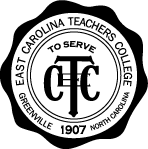
Gray Richmond King, a respected educator turned agribusinessman, served on the ECTC board of trustees from 1921-1925 during the opening years of East Carolina’s new academic standing as a teachers college. As a trustee, King helped guide the school as it moved forward with an unprecedented doubling of faculty numbers, student enrollment, and campus infrastructure. However, King also took responsibility for introducing the resolution conferring certain limited but also unchecked fiscal powers to the president of the school, ones that inadvertently led later to the scandalous end of the presidency of Dr. Leon Renfroe Meadows (1884-1953).
King was born in Nash County and later graduated from Wake Forest College (then north of Raleigh), where he was – despite his standing as the only Methodist in his class at a Baptist school – valedictorian of the class of 1897. He subsequently taught school in Rockingham and Raleigh before serving as superintendent of the Wilson City Graded Schools from 1900 through 1907. Following his resignation as superintendent, King was named principal of a public school in Raleigh, a position he retained until 1909. King then turned to business, running the King Cooperative Store in Nashville before taking a position with the Farmers Cotton Oil Company of Wilson, where he worked until his retirement in 1957.
Most notably for ECTC history, King was the board member who introduced, in 1924, the resolution authorizing the ECTC president to handle certain funds himself without significant accountability. King later explained, in 1945 when Dr. Meadows was on trial, that his intent was simply to “eliminate red tape” in handling small matters that arose from time to time, and “to express the confidence of the members of the board in their president, Dr. Wright.” King admitted that the resolution required “no accounting for such funds,” and later observed that “that is where this trouble began, leaving matters in this loose way.” Wright’s successor, Leon Meadows, was charged with misuse of college funds and eventually tried and indeed convicted for embezzlement.
Defending Dr. Meadows during his trial in the spring of 1945, King, then no longer a trustee, noted that Wright was never called upon for a report of his spendings and suggested that Meadows most likely “thought he would be treated in the same way.” While admitting that the power allowed the president was too loose, King said “It just doesn’t look like fair play to allow a thing like that to run on loosely for 20 years and all at once call for a reckoning that was … never … [previously] required.” He added that “those who know Dr. Meadows well can never be convinced of his guilt in misappropriating this money.” King, incidentally, was not alone in his defense of Meadows: as the scandal unfolded in 1944-1945, the ECTC trustees voted, though not unanimously, to exonerate Meadows and later, to remove those whom Meadows had accused of campus agitation. This chapter, one of the most unfortunate in the history of East Carolina, was set in motion, quite innocently, by King’s earlier resolution.
Sources:
- “Bits of Flood History, Mr. Gray King Points Out At Least Two Precedents to the Recent Deluge.” Farmer and Mechanic. August 11, 1908. P. 7.
- Cotton and Tobacco Situation Discussed: Nash County Farmers Indignant at Prices.” Nashville Graphic. September 23, 1920. P. 5.
- “Gray R. King.” News and Observer. April 10, 1962. P. 19.
- King, Gray R. “First Gun at Gettysburg: Gallant Career of Private John Brown of Nash in the Confederate Army.” Morning Post. August 7, 1904. P. 14.
- King, Gray R. “More About Meteors.” News and Observer. December 22, 1934. P. 4.
- King, Gray R. “The People’s Forum: The Meadows Case.” News and Observer. April 4, 1945. P. 4.
- “Noted Scientist Visits Nashville: Dr. C. W. Hewlitt Calls on His Former Teacher, Gray R. King.” Nashville Graphic. August 13, 1936. P. 1.
- “Prof. King Chosen: As Principal of One of the Capital City Schools.” News and Observer. May 28, 1907. P. 5.
- “Summer School Work, Great Gathering of Teachers at Knoxville, Tenn.” Morning Post. July 29, 1905. P. 2.
- “Superintendent Resigns: Prof. Gray R. King Will Give Up His Work in Wilson.” North Carolinian. April 11, 1907. P. 6.
- “The Farmer’s Meeting: Quite a Number Gather and Discuss Cotton and Tobacco Outlook.” Nashville Graphic. August 27, 1914. P. 3.
Citation Information
Author: John A. Tucker, PhD
Date of Publication: 10/19/2022